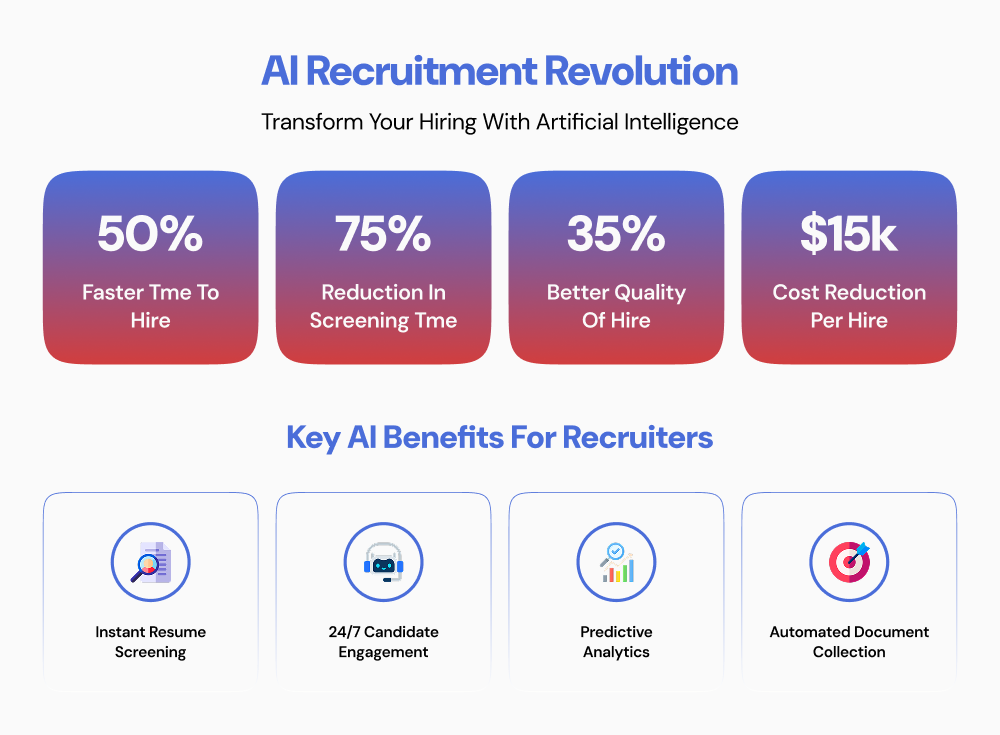Reducing Time to Hire with AI in Recruitment
Read Time
10 minutes
Updated On
January 9, 2026
.jpeg)
Ruchi Kumari
Content & Thought Leadership
.png)
In today’s hyper-competitive talent market, reducing time to hire is no longer optional, it’s a business-critical imperative. With 73% of top candidates receiving multiple offers within just 7 days, companies with slow hiring processes aren’t competing; they’re falling behind.
Artificial Intelligence is transforming recruitment by enabling organizations to hire up to 50% faster while significantly improving candidate quality and experience.
This comprehensive guide explores how AI recruiter agent is transforming talent acquisition, reducing time to hire from weeks to days, and delivering measurable ROI for forward-thinking organizations.
Time to hire measures the days between when a candidate applies and when they accept your offer. In 2024's candidate-driven market, this metric can make or break your talent acquisition strategy.
The Hidden Costs of Slow Hiring:
Conversely, organizations with streamlined hiring processes see 3.5x higher revenue growth and 2x better employee retention rates.
Modern AI recruitment agent leverage machine learning, natural language processing, and predictive analytics to eliminate traditional hiring bottlenecks. Here's how leading organizations are achieving breakthrough results:
Traditional resume screening consumes 23 hours per hire on average. AI-powered screening systems revolutionize this process by:
AI tools are streamlining repetitive tasks like resume screening and interview scheduling, allowing recruiters to focus on strategic roles. According to HR Digest insights on how AI talent strategies are shaping the future of hiring, 61% of talent acquisition professionals believe AI can enhance the quality of hires by improving candidate matching, directly contributing to how to improve hiring process. However, AI's potential goes beyond automation; it's about aligning talent with organizational goals in a rapidly evolving job market.
Result: 75% reduction in screening time with 40% improvement in candidate quality scores.
Modern candidates expect instant communication. AI chatbots maintain engagement throughout the hiring journey by:
Organizations using AI chatbots report 65% higher candidate satisfaction scores and 30% lower drop-off rates.

AI doesn't just automate hiring, it provides predictive insights that transform hiring strategy, it provides predictive insights that fundamentally transform hiring strategy. These systems analyze historical data to forecast future hiring needs based on business growth patterns, calculate the likelihood of candidate success using performance data, and identify candidates most likely to stay long-term. Advanced platforms even determine optimal salary offers to maximize acceptance rates while maintaining budget control.
As IBM research shows, CEOs are betting big on AI returns: 85% expect positive ROI from AI efficiency investments by 2027, while 77% anticipate gains from AI growth initiatives. IBM also found that 61% of CEOs are actively adopting or preparing to scale AI agents across their businesses. creating unprecedented demand for AI-savvy professionals. This predictive capability enables talent acquisition teams to shift from reactive to proactive hiring, building talent pipelines before positions become urgent and making data-driven decisions that improve both speed and quality of hire.
Modern hiring platforms now use AI recruiter agent to automate not just the collection and verification of candidate documents like IDs, certifications, and work authorizations, but also the generation and delivery of offer letters. This dual automation eliminates manual follow-ups, reduces administrative delays, and ensures compliance with legal and organizational standards from the very beginning.
By streamlining both documentation and offer processes, companies accelerate hiring timelines, reduce drop-offs, and create a smoother candidate experience.
Result: Organizations report up to a 40% reduction in onboarding delays and significantly faster offer acceptance rates, all while staying audit-ready and compliant.
Successfully implementing AI in recruitment requires a strategic approach that balances technological capability with human insight.
Start with a comprehensive process audit to identify where candidates drop off most frequently, which stages take the longest to complete, and what manual tasks consume the most recruiter time. This analysis reveals your specific pain points and guides your AI tool selection.
Choose AI solutions that address your unique challenges by selecting platforms that offer seamless ATS integration, customizable screening criteria, real-time analytics dashboards, and mobile-optimized candidate experiences. The key is finding tools that complement your existing workflow rather than replacing it entirely.
Invest in team training and change management because success requires human-AI collaboration. Your team needs comprehensive training covering AI tool functionality, data interpretation, maintaining human connection in candidate interactions, and ethical AI use with bias prevention.

Ensure ethical AI implementation through regular bias auditing, transparent decision-making processes, diverse training data sets, and robust candidate privacy protection protocols. Ethical considerations aren't just compliance requirements, they're competitive advantages that strengthen your employer brand.
Track performance metrics consistently to validate your investment and identify optimization opportunities. Monitor time to hire reduction targeting 30-50% improvement, quality of hire through 90-day performance scores, candidate satisfaction via Net Promoter Scores, and cost per hire calculations. Use these insights to refine your AI tools and processes monthly.
AI isn't replacing human recruiters; it's empowering them to focus on strategic relationship-building while technology handles routine tasks. Organizations that embrace AI-driven recruitment today will capture tomorrow's top talent faster, more efficiently, and with better outcomes than ever before.
The question isn't whether AI will transform your recruitment process, it's whether you'll lead the transformation or be left behind by competitors who act faster.
